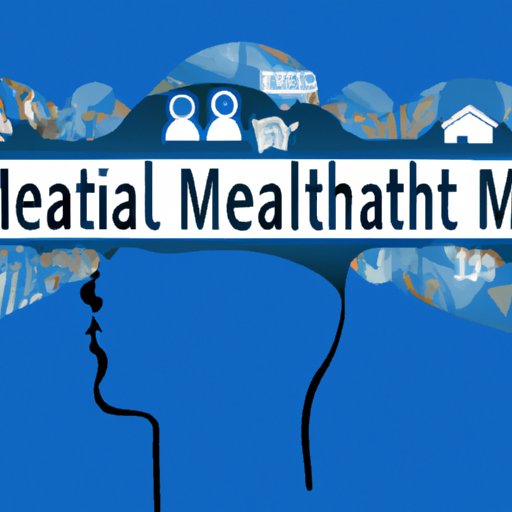Introduction
Mental health and behavioral health are often used interchangeably, but they are not the same thing. Mental health is an umbrella term that includes our overall psychological well-being, while behavioral health focuses on our behaviors and how they affect our mental health. In this article, we will explore the differences and similarities between mental health and behavioral health, investigate how behavioral health can affect mental health, and examine the role of mental health professionals in addressing behavioral health issues.

Exploring the Difference between Mental Health and Behavioral Health
Mental health refers to a person’s overall psychological well-being. This includes how we think, feel, and act. Mental health is affected by many factors, such as genetics, environment, lifestyle, and stress. Mental health is usually diagnosed through clinical assessment and diagnosis, which includes evaluating a person’s thoughts, feelings, and behavior.
Behavioral health, on the other hand, focuses on our behaviors and how they affect our mental health. It is concerned with understanding why certain behaviors occur and how those behaviors can be changed or modified. Behaviors can range from mild to severe, and can include anything from substance use and abuse to eating disorders. Behavioral health is typically addressed through various therapies and treatments, such as cognitive-behavioral therapy (CBT) and dialectical behavior therapy (DBT).
Mental illness can also play a role in behavioral health. Mental illness is a broad term that encompasses several different conditions, such as depression, anxiety, bipolar disorder, schizophrenia, and post-traumatic stress disorder (PTSD). Mental illness can cause changes in a person’s behaviors, and it can also be caused by certain behaviors. For instance, substance abuse can lead to mental illness, and mental illness can lead to substance abuse.
Examining the Similarities and Differences of Mental and Behavioral Health
Although mental health and behavioral health are distinct concepts, there are some commonalities between the two. Both involve understanding and managing thoughts, feelings, and behaviors. Both involve identifying and working through triggers and underlying issues. And both involve learning coping skills to manage difficult situations. However, there are some key differences between mental health and behavioral health.
One key difference is that mental health involves understanding and treating the root causes of mental illness, while behavioral health focuses on changing behaviors that may contribute to mental illness. For example, a person with depression may need to understand and address the underlying causes of their depression, such as a traumatic event or a chemical imbalance. On the other hand, a person with an addiction may need to work on changing their behaviors, such as avoiding triggers and developing healthier coping strategies.
Another difference is that behavioral health often involves identifying and addressing external factors that may be contributing to a person’s mental health issues. This could include family dynamics, cultural influences, and social pressures. Mental health, on the other hand, is more focused on internal factors, such as thoughts, feelings, and beliefs. Additionally, mental health professionals typically specialize in diagnosing and treating mental illness, while behavioral health professionals focus on changing behaviors.
Investigating the Role of Behavioral Health in a Person’s Mental Health
Behavioral health can play a significant role in a person’s mental health. It can help people develop healthier coping strategies and identify and address external factors that may be contributing to mental health issues. Additionally, behavioral health can provide insight into why certain behaviors occur and how they can be changed or avoided.
Behavioral treatments, such as CBT and DBT, can also be beneficial for people who are dealing with mental health issues. These treatments can help people learn how to better manage their thoughts, emotions, and behaviors in order to improve their overall mental health. Additionally, these treatments can help people gain insight into their underlying issues and develop healthy coping strategies to deal with difficult situations.
How Can Behavioral Health Affect Mental Health?
Behavioral health can have a profound impact on a person’s mental health. For instance, substance abuse can lead to mental illness, and mental illness can lead to substance abuse. Additionally, certain behaviors, such as self-harm or disordered eating, can contribute to depression and anxiety. Other behaviors, such as engaging in risky activities or isolating oneself, can lead to negative consequences and further exacerbate mental health issues.
There are also certain conditions where behavioral health can have a direct effect on mental health. For example, autism spectrum disorder (ASD) is a condition that affects communication and behavior, and it can also lead to mental health issues such as depression and anxiety. ADHD is another condition that can affect behavior and lead to mental health issues if left untreated.
The benefits of combining mental and behavioral health care are numerous. Research has shown that combining mental and behavioral health care can lead to improved outcomes for those dealing with mental health issues. Additionally, combining the two can lead to better understanding of the underlying causes of mental health issues, more effective treatment plans, and greater overall well-being.

The Role of Mental Health Professionals in Addressing Behavioral Health Issues
Mental health professionals play an important role in addressing behavioral health issues. Mental health professionals can provide individual and group therapy, medication management, and crisis intervention. They can also provide support, guidance, and education to help individuals develop healthier coping strategies and identify and address external factors that may be contributing to their mental health issues.
Mental health professionals are also trained to recognize signs and symptoms of mental illness and diagnose mental health conditions. They can then create customized treatment plans that combine mental health treatments, such as psychotherapy, with behavioral health treatments, such as CBT and DBT. Additionally, they can provide referrals to specialists, such as psychiatrists, psychologists, and social workers, when necessary.
What Are the Benefits of Combining Mental and Behavioral Health Care?
Combining mental and behavioral health care can lead to improved outcomes for those dealing with mental health issues. A study published in The American Journal of Psychiatry found that people who received combined mental and behavioral health care experienced better symptom control and fewer hospitalizations than those who only received mental health care. Additionally, research has shown that combining mental and behavioral health care can lead to improved communication between providers, better understanding of the underlying causes of mental health issues, more effective treatment plans, and greater overall well-being.
People who are looking to access combined mental and behavioral health care should speak to their primary care provider or mental health professional. They can provide referrals to specialists, such as psychiatrists, psychologists, and social workers, who can provide comprehensive care. Additionally, many states offer mental health and substance abuse services through their local health departments and state mental health agencies.
Conclusion
Mental health and behavioral health are distinct concepts, but they are deeply intertwined. Mental health involves understanding and treating the root causes of mental illness, while behavioral health focuses on changing behaviors that may contribute to mental illness. Combining mental and behavioral health care can lead to improved outcomes for those dealing with mental health issues, and mental health professionals can provide referrals to specialists who can provide comprehensive care. By understanding the differences and similarities between mental health and behavioral health, as well as the benefits of combining them, we can better understand how to address mental health issues and improve overall well-being.
(Note: Is this article not meeting your expectations? Do you have knowledge or insights to share? Unlock new opportunities and expand your reach by joining our authors team. Click Registration to join us and share your expertise with our readers.)
